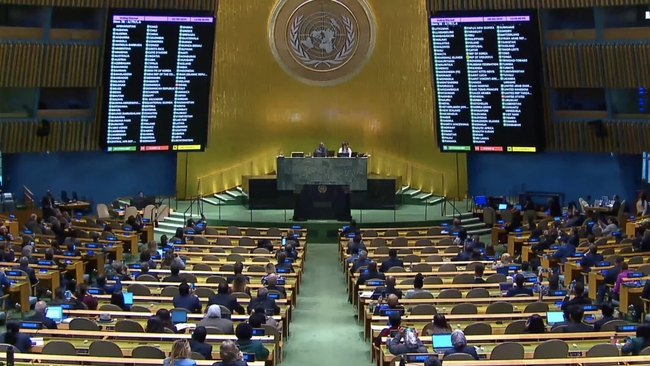UN General Assembly overwhelmingly condemns the US blockade and calls for its end
News from Cuba | Saturday, 9 November 2024

For the 32nd consecutive year, the United Nations General Assembly (UNGA) voted to condemn the US economic, commercial and financial blockade of Cuba and, once again, it has done so by an overwhelming majority.
187 countries voted in favour of Cuba’s resolution on the necessity of ending the blockade, with just 1 abstention (Moldova) and the usual suspects of the United States and Israel voting against.
On the floor of the Assembly, Cuba detailed the crushing impact of the blockade, worsened in recent years due to its intensification by Presidents Trump and Biden.
Representatives of nations from all over the world similarly condemned the illegal blockade and detailed the contributions that Cuba has made to humanity.
“Let Cuba live in peace”
Just over a week before the UNGA debated and voted on Cuba’s resolution, the island experienced its worst blackouts in recent memory. Bruno Rodriguez Parrilla, Cuba’s Minister for Foreign Affairs, recalled how from 18 to 23 October Cuban families had no electricity, except for maybe a few hours:
“Many Cuban families lacked running water; hospitals worked under emergency conditions, schools and universities suspended their classes; [and] businesses interrupted their activity,” he said.
Since 2019, the United States government has adopted increasingly harsh measures of economic warfare designed to prevent the supply of fuel and spare parts needed to maintain Cuba’s power plants and electric grid.
“How long will this go on?” Parrilla asked. Describing the blockade as “a flagrant, massive and systematic violation of the human rights of our people” and “the most encompassing, comprehensive and longest-standing system of unilateral coercive measures ever applied against any country”, he implored the United States to “Let Cuba live. Let Cuba live in peace.”
Earlier this year, the Cuban Ministry of Foreign Affairs published its annual report detailing the impact of the blockade and it, as it has done in recent years in particular, makes for difficult reading. From March 1 2023 to February 29 2024, the blockade caused material damages to Cuba estimated at $5,056,800,000.
The report details the daily “shortages suffered by Cuban men and women, which include foodstuffs, medicines, fuels, means of transportation; as well as the deterioration of other basic services.”
The world needs more vaccines, more solidarity; not more blockade
Speaking on behalf of the Community of Latin American and Caribbean States (CELAC), Honduras’ representative said that the unjust inclusion of Cuba on the US government’s State Sponsors of Terrorism List “has increased the chilling effect” of the blockade and worsened Cuba’s chances of establishing financial relations with international partners.
Brazilian Foreign Minister Mauro Luiz Iecker Vieira echoed these words, arguing that that an end to the blockade would “be fundamental for Cuba to be able to overcome” its challenges and guarantee the well-being of its people.
Vieira also reminded the Assembly of the fundamental illegality of the blockade, as the only sanctions permitted under international law are those adopted by the UN Security Council under the terms of the UN Charter.
This point was repeated by Chile’s Ambassador to the UN Paula Narváez Ojeda who reaffirmed her country’s conviction that the implementation of unilateral coercive measures runs counter to international law.
“Chile does not agree with the imposition of unilateral sanctions of any kind, the only legitimate sanctions are those adopted by the Security Council in the exercise of its authority for the maintenance of international peace and security,” she said.
Representatives from Africa highlighted Cuba’s commitment to the people of the continent. Chad’s speaker, on behalf of the African Group, said that Cuba has for decades made “numerous positive contributions to Africa, and many other States, and people all over the world”.
Speaking for the Group of Friends in Defence of the Charter of the United Nations, Eritrea’s UN representative, Sophia Tesfamariam Yohannes, celebrated Cuba’s achievements in developing its own COVID-19 vaccines which they “put to the service of humanity.”Adding that “the world needs more vaccines, more solidarity; not more blockade,”she said the US’s policy represents a “form of collective punishment on the Cuban population.”
Gabon’s representative, Ambassador Aurélie Flore Koumba Pambo, voiced her country’s concern over the continuing blockade, whose “scale of its impact is more and more harmful to the Cuban people,” and “clearly a hostile act to regional and continental cohesion”. It is, she added, “the main obstacle to the social and economic development of Cuba”.
The overwhelming consensus on display at the UNGA is in stark contrast to the indifference of the United States, whose government persist with the line that its unilateral sanctions are in place to help, not harm the Cuban people. Unfortunately, while the Assembly’s vote is an marker of international opinion and carries significant political weight, it is only the United States Congress that can lift the blockade and let Cuba live.






